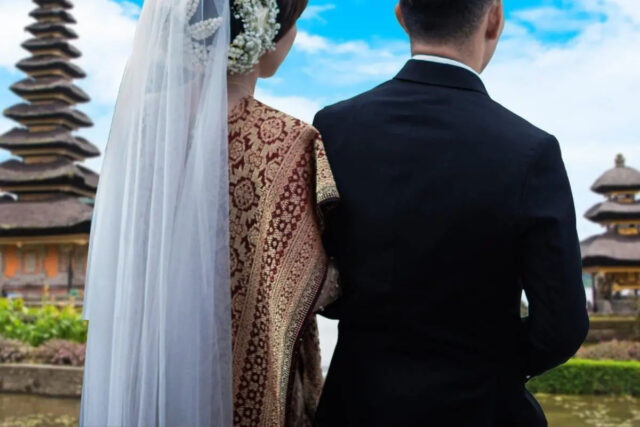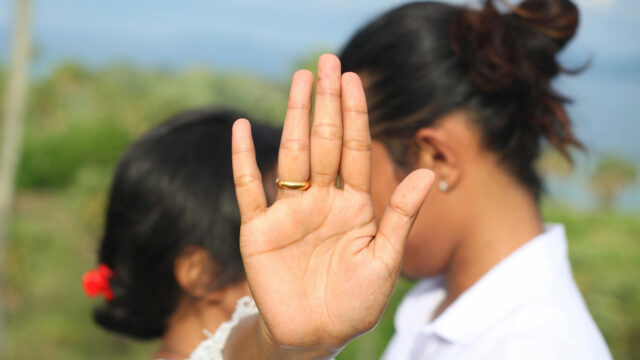In Indonesia, a troubling trend has emerged where women from impoverished backgrounds become “temporary wives” to male tourists in exchange for money. Known as “pleasure marriages” this practice has become particularly common in the Puncak region, driven by economic hardship.
Although these marriages are illegal under Indonesian law, weak enforcement has allowed the practice to continue, raising ethical concerns about the exploitation of vulnerable women.
These women, facing financial difficulties, see these marriages as a means of survival. The practice has grown into an industry that affects the women involved and influences the local economy through tourism.
While some may argue that these marriages offer a way out for struggling women, the consequences of such arrangements run deep.
The Rise Of Pleasure Marriages
Pleasure marriages, or nikah mut’ah, originated as a Shia Islamic practice. Nikah mut’ah is a type of temporary marriage that exists in Shia Islamic tradition.
In this practice, a man and a woman agree to get married for a specific amount of time, which can be as short as a few hours or as long as several years. They also decide on a certain amount of money (dowry) that the man will give the woman.
This marriage differs from regular marriages because it’s meant to last only for the agreed period, after which the marriage automatically ends.
In the context of Indonesia, such short-term marriage is not recognized by the law and is considered illegal because it doesn’t align with the country’s idea of marriage, which is supposed to be long-term and focused on building a family. Many religious scholars also find the practice controversial and unethical because it can be used to exploit women.
However, this tradition has taken on a different form in Indonesia. Women from low-income areas enter into short-term marriages with tourists, who offer a dowry in return.
Poverty and desperation push many women into these unions, turning what was once a religious practice into a way to meet economic needs. As Professor Yayan Sopyan explains, “Tourism meets this economic need,” referring to how male tourists fuel the demand for these temporary marriages.
Although nikah mut’ah is legitimate in certain religious contexts, Indonesia does not recognize it. In areas like Puncak, this practice operates outside the law. Despite regulations banning such marriages, the lack of enforcement allows the industry to thrive, leaving many women vulnerable to exploitation.
Economic Pressures On Women
For many women, the decision to enter pleasure marriages is driven by financial struggles. Cahaya, who began at the age of 17, recalls her first marriage to a 50-year-old tourist from Saudi Arabia, for which she received $850.
Over time, she has married 15 men, using the money to support her family and cover basic expenses. On average, she earns between $300 and $500 per marriage, barely enough to get by.
These women often have limited access to education and job opportunities, leaving them with few choices. Pleasure marriages become a means of survival in the face of economic hardship.
As Budi Priana, who initially introduced Cahaya to a broker, explains, “There are always new girls contacting me looking for contract marriages, but I tell them I’m not an agent. The economy is getting worse, and they are so desperate to get jobs.”
Also Read: Indonesia To Introduce Compulsory Pre-Wedding Course For Couples; Will India Follow Suit?
The Harsh Reality Of Exploitation
While these marriages may seem like a quick way to earn money, the reality is often harsh. Women like Cahaya have shared their experiences of mistreatment and abuse.
During one marriage, she was taken to Saudi Arabia and treated like a slave, forced to do unpaid housework while being subjected to verbal abuse.
Los Angeles Times reported, “I was treated like a slave: he would spit on my meals, scream at me every night, and break things,” Cahaya revealed, describing the terrible conditions she endured.
Many women face emotional and psychological trauma from these experiences. Repeatedly entering and leaving these marriages leaves them feeling trapped.
Nisa, another woman who married more than 20 times, eventually left the practice after meeting an Indonesian man. Now with two children, she is determined never to return to that life, saying, “I’m determined not to return to my previous life.”
The Need For Change
The illegal nature of these marriages and the exploitation involved have sparked widespread outrage. Many people are calling for stricter enforcement of laws that ban contract marriages. Social media reactions have been strong, with users criticising the practice as a form of human trafficking.
One person commented, “This dark industry of temporary marriages may boost tourism, but it leaves the government powerless.” There is also a growing demand for education and vocational training to empower women, helping them find alternatives to such exploitative arrangements.
To truly address the issue, there must be a shift in focus from seeing these marriages as an economic necessity to recognizing them as a human rights issue. Providing women with education, skills, and job opportunities can offer them a way out. Giving women better choices will be a key step in ending this practice.
Pleasure marriages in Indonesia are a troubling consequence of poverty and a lack of opportunities. While they may offer short-term financial relief, they come with long-term costs for the women involved. To combat this, stronger legal enforcement and better economic opportunities for women are needed.
With the right efforts from the government and support systems, it is possible to protect women from exploitation and help them build better lives. Ending this harmful practice will require collective action to ensure these vulnerable women are no longer trapped in a cycle of abuse.
Image Credits: Google Images
Sources: Hindustan Times, Economic Times, Times Now
Find the blogger: Katyayani Joshi
This post is tagged under: Pleasure Marriages, Nikah Mutah, Women Empowerment, Exploitation, Indonesia Tourism, Human Rights, Temporary Marriage, Economic Struggles, Women In Poverty, Tourism, Exploitation, Social Justice, End Human Trafficking, Women Rights, Indonesian Law, Shia Islam, Ethical Tourism, Women, Poverty, Exploitation
Disclaimer: We do not hold any right, or copyright over any of the images used, these have been taken from Google. In case of credits or removal, the owner may kindly mail us.





































